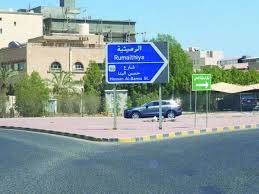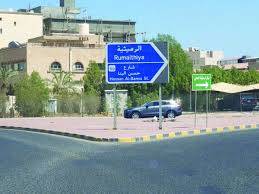Kuwait is preparing to remove a sign from one of the streets in the capital that bears the name of the founder of the Muslim Brotherhood, Hassan al-Banna, similar to many other personalities whose names have been granted to streets in Kuwait over the decades. The Ministry of Works and the Municipality of Kuwait announced the replacement of street names that belong to personalities who are not heads of state with alternative numbers. However, the Kuwaiti Brotherhood and their supporters from the Brotherhood diaspora have focused on Hassan al-Banna Street more than any other street scheduled for change. According to a decision by the Kuwaiti Cabinet, naming some streets will be limited to sultans, kings, rulers, princes, and heads of states. Regarding streets that carry the names of countries and capitals, they will be treated reciprocally. The implementation of this decision includes changing the names of several streets, including Hassan al-Banna Street, prompting the Egyptian Cabinet to review this decision in its first meeting after its formation. It is hoped that they will have the courage to change the names of Cairo streets that bear inappropriate names, which are alien to the Egyptian context and remnants of past eras of oppression and subjugation.
It is known that there is a committee to review street names in Cairo, and it would be beneficial for the designated Prime Minister, Dr. Mustafa Madbouly, to request a report on the committee's activities and review its criteria for changing names. Historical tyrants and occupiers' names still dominate the streets, and there remains an insistence on this under the pretext of public sentiment wishing for these names to remain (there are no accurate scientific measures for what is called public sentiment). Cairo, like other provinces, should celebrate in its blue street signs the names of distinguished and historical leaders, and foremost among them the martyrs, with a simple identification of their national achievements under each name.
It is necessary to purge the popular memory of the stains it acquired during times of tyranny; it is astonishing to endure the persistence of names historically proven to have tyrannized the Egyptians. Imagine names dating back to the French campaign, similar to those of British occupation generals, and so on, reaching Cambyses II, the Achaemenid king (the Persians), who conquered Egypt in 525 BC. Not to mention odd, strange, and ridiculous names, some streets in the blessed land are burdened with names that lack legitimacy.
I recall a successful popular campaign to erase the name of "Selim I" from a street in the Zaytoun area, being the first colonizer of Egypt, yet the name "Qurra ibn Sharik" still pierces the eyes in Giza; he was one of the Umayyad princes who governed Egypt in 90 AH and was described by Ibn Taghri Birdy as "being poorly managed, wicked, oppressive, and corrupt." The street "Al-Ma'mun," named after the caliph in Heliopolis, remains prevalent, with the history encyclopedia of the patriarchs stating that Al-Ma'mun was known for suppressing the Egyptian revolution known at that time as "Al-Bashmour" during the Abbasid rule. This is just an example among many, and the question is: How long will invaders and tyrants continue to occupy street names in Egypt as a significant indication of the ongoing history of conquest and tyranny?




